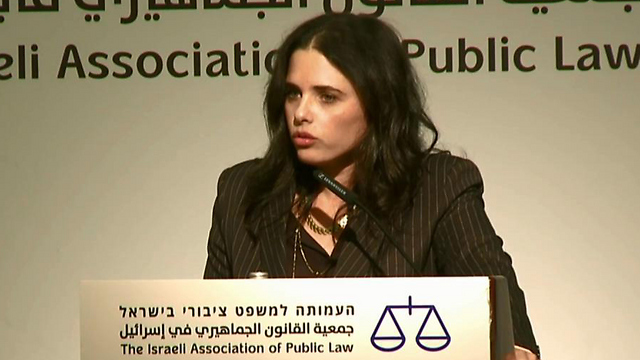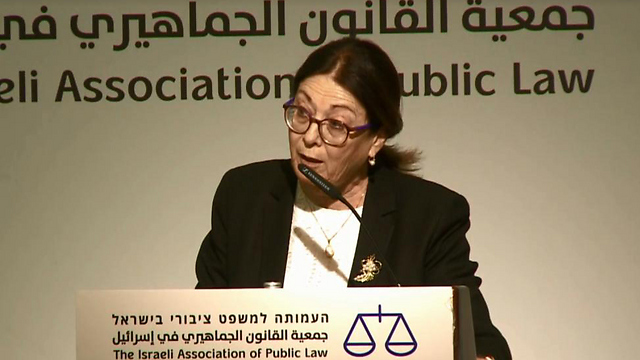
Shaked, Chief Justice Hayut clash on Supreme Court powers
Justice Minister Shaked, Supreme Court Chief Justice Hayut outline opposing views on judicial review of Knesset laws; Court detached, fears people, Shaked says, Hayut counters by saying politicians wished for court to make tough decisions, then protested; AG Mandelblit adds court's role is to defend minority from tyranny of majority.
Justice Minister Ayelet Shaked and Supreme Court Chief Justice Esther Hayut clashed in a conference organized by the Israeli Association of Public Law in Zikhron Ya'akov Thursday evening, with the minister attacking the supreme court for its detachment and the chief justice retorting by criticizing statements made by elected officials against the court.
The justice minister, who recently promoted Basic Law: Legislation along with fellow Bayit Yehudi member Education Minister Naftali Bennett, said, "Israeli democracy is distancing itself from the people. It stems from a deep-seated, ancient fear of the people and the distance between it and the old elites' aloofness and detachment from the realities of life," Shaked said.
Chief Justice Hayut, meanwhile, responded by saying, "Dialogue between the branches of government is essential to a democratic country even if there are tensions, with each branch maintaining the dignity of the others. Unfortunately, the manner in which certain ministers and MKs speak about the judiciary is far from being respectable with recent examples being especially shameful."

The Bayit Yehudi ministers' bill was intended to regulate officially the court's ability to strike down laws—the first attempt to do so since the so-called "judicial revolution" of the 1990s.
In her speech, Shaked hinted at the fact she believed such rulings had no legal leg to stand on. Hinting at the High Court's ruling on African immigrants, the minister said the court "only considered utopian Jerusalem, not actual south Tel Aviv."
Harking back to her comment about democracy distancing itself from the people, Shaked said Israeli democracy existed "a considerable distance away from regular folks and was feeding off of its lack of sufficient familiarity with the people and their needs, weaknesses, frustrations, advantages and desires. It's predicated on choosing the pure judicial norm over concrete reality, which will forever be harsher and more complex than any legal casuistry."

'The people have become a danger lurking on every corner'
Shaked said the judiciary was separating the "demos" (or Greek for "common people") with the "kratos" (Greek for "strength"), thereby "turning the 'demos' into a demon, with the people becoming a danger lurking on every corner. The people decisions, according to this new political theory, were driven not by thoughts but by emotions, by impulses and not opinions. It is for this reason that the people's rules—as they were enacted by its elected officials—are often deemed to be ruinous."
The justice minister further maintained her proposed Basic Law will bring the Israeli system of government back to its age-old democratic roots. Shaked even pointed a barb at the justices, saying, "This important law cements the well-known legal principle that any action by a governmental authority must be carried out according to law. This rule does not, should not and will not have any exceptions, even when it comes to the judiciary wishing to strike down Knesset laws with explicit legal standing."
Judicial review of laws, Shaked said, could not be predicated on "the basis of slim legal texts and generous interpretative acrobatics. Preserving the 'rule of law' should also be based on the law."
'The true test: when positions don't match'
Chief Justice Hayut spoke at the conference as well and said the court endeavored to allow the pertinent authority to decide on the matter at hand and only in such cases as that is not possible will it intercede. "If anyone believes respecting the legislative and executive branches meant turning a blind eye to the rule of law and humans rights, they are sorely mistaken," Hayut added.
"The true test does is not found when the court's opinion matches that of the elected officials, but when they don't match. It would not be an exaggeration to expect criticism to be worded properly and be levied at an issue and not at judges or the court," the chief justice reprimanded.

On claims of the court's over-involvement, Hayut said, "Truth be told, we come across public officials who drag their feet and avoid making decisions, instead preferring for the court to 'do the dirty work for them.' It's a repeated pattern. Then, when the Supreme Court decides on a matter, they cry out over lost governance."
In his own speech, Attorney General Avichai Mandelblit also professed adamant objection to Bennett and Shaked's bill. "It seems some people believe any decision reached by a Knesset majority is necessarily legitimate. They usually are of that opinion when they themselves are in the majority.
"This stance, however, ignores the fact the majority may reach decisions injurious to the minority. In such cases, the only entity that may defend the minority from the tyranny of the majority is the court system. The most important role of the court, constitutionally speaking, is to defend the minority and preserve human rights. That is indeed what Israel's Supreme Court does."
On more earthly matters, Attorney General Mandelblit also noted investigations into Prime Minister Benjamin Netanyahu's affairs were near their end and that he was "disturbed by public discourse."
Mandelblit said that it seemed "All sides think they know the final outcome already. Neither camp can push us off our path, however."

Two days following Prime Minister Netanyahu's speech in which he said "So there will be (indictment) recommendations. So what?", Mandelblit said that "the status of the police and the State Prosecutor's Office should be protected and their legitimacy should not be undermined by baseless statements."
"One of the challenges with the rule of law has to do with interrogating public officials," he added. "It's no secret that the investigations against the prime minister are advancing, and may conclude soon. Only one thing guided us through this journey: suspicions and the law. But I am disturbed by the public discourse on this."
"It appears all sides think they know the final outcome and I honestly wish I did as well. One side demands one thing and the other demands something else, but neither demonstrations for nor demonstrations against or videos or commentators that aren't really familiar with the facts or evidence—not one of those thing can or will influence the law enforcement system. They will not push us off our path," the attorney general vowed.
"No deviation can be accepted, either to leniency or severity. It's obvious we should not be lenient with officials being questioned as the "French Bill" or Recommendations Law in its original version suggest, and we certainly should not convict or indict a suspect before the investigation has run its course," Mandelblit concluded.










